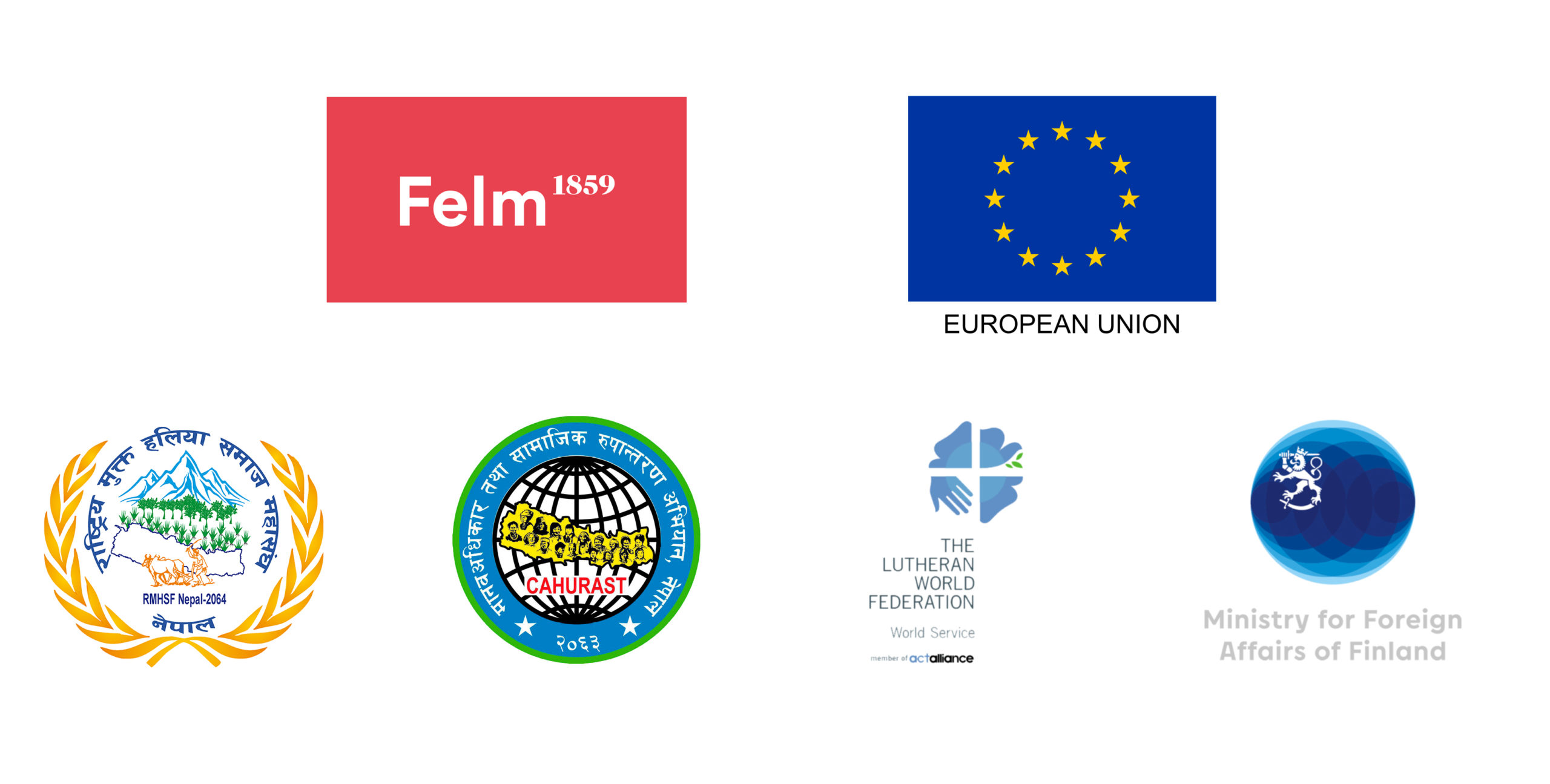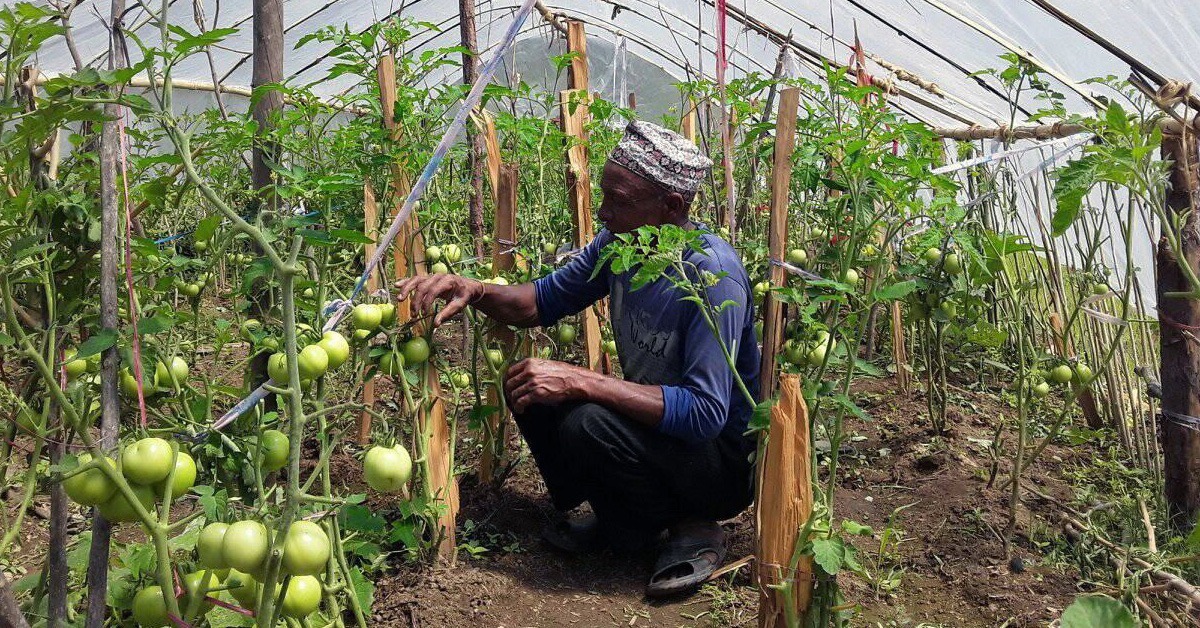(Below in Nepali)
Becoming freed Haliyas was a dream come true for the ex-bonded laborers of Western Nepal who were forced to work as agricultural bonded labor for more than 100 years.
In the aftermath of the Nepali government announcing the abolishment of the Haliya system all over Nepal on the 6thof September 2008, the major change for freed Haliyas has been the opportunity to weave one’s own economic freedom now that they are not obliged to work on other people’s lands anymore.
However, the continuing situation of living below poverty line has forced the majority of freed Haliyas to choose foreign employment in order to reduce the burden of supporting their families and paying the piling loans taken to meet everyday requirements. Nowadays, more and more freed Haliyas are migrating to either Gulf countries or the neighboring country India in search for better fortunes.
The rise of COVID-19 and economic obstacles
With the rise of the Covid-19 pandemic, freed Haliyas who had gone abroad for foreign employment, especially to neighboring India, had to return to their hometowns when facing new restrictions and loss of livelihood. As a detrimental fall-out of the pandemic, there has been a decrease in the job opportunities for freed Haliya returnees, and especially for those who have faced mental health issues due to the pandemic. This we have noted while talking with different Haliyas and Haliya activists.
A recent study “Rapid Assessment of the Social and Economic impacts of COVID-19 on the vulnerable groups in Nepal”, commissioned by the UN Development program in Nepal and conducted by the Institute of Integrated Development Studies, shows that Covid-19 pandemic has disrupted supply chains, shut or threatened the survival of small and informal enterprises, and made people highly vulnerable to falling back into poverty through widespread loss of income and jobs. Three in five employees lost their jobs due to Covid-19 in Nepal.[1]
During the pandemic, Ministry of Land Management, Agriculture and Cooperatives in Nepal has been providing funding for a variety of livelihood programs. According to Rastriya Mukta Haliya Samaj Federation Nepal (RMHSF-N), a local organization working to improve the rights of Haliyas, only 1 percent of freed Haliyas have been able to receive those funds.
RMHSF-N is part of a consortium of four organisations that are implementing a new European Union funded project in the farwestern parts of Nepal. Other organisations include Felm, Lutheran World Federation (LWF), and Campaign for Human Rights and Social Transformation Nepal (CAHURAST). With the support of the European Union, the consortium is partnering up to combat discrimination of freed Haliyas, including persons with disabilities and women, who face the double burden of discrimination.
The project aims to produce verified data about the economic, social and cultural rights situation of freed Haliyas. This data will be gathered trough an innovative mobile app.
Freed Haliya families seizing opportunities
Hari Singh Bohora, program coordinator at RMHSF-N, reports from Western Nepal that some freed Haliyas have been able to find alternative livelihoods despite the Covid-19 crisis.
One of them is Kheeure Bishwakarma, a resident of Bhimdatta Municipality, Kanchanpur. Already a decade ago, he and his wife went to India for employment. After the rise of Covid-19, with diminishing source of income, his wife first returned to Nepal. Soon the husband had to follow. This freed Haliya couple did not want to stay jobless, so even amid the pandemic they were able to start a small grocery shop.
Another one is Chakra Ram Luhar from Shuklaphanta, Kanchanpur, who also one of the migrant returnees who had to return back to Nepal during the lockdown caused by Covid-19. He started a poultry farming to raise their family in collaboration with three friends.
“A few other freed Haliya returnees have started to engage themselves in daily wage construction works. Those who have earned a piece of land have started to cultivate the vegetables in small scale commercial way”, program coordinator Hari Singh Bohora elaborates.
Despite the pandemic trying to cut off their livelihoods, freed Haliyas are choosing to seize their opportunity in order to improve their quality of life. Still, more support is needed – from both the international as well as the Nepali community – to bring about a sustainable change in the lives of freed Haliyas. Perhaps now more than ever, with Covid-19 pandemic slowing down the progress of the most vulnerable towards a dignified life.
Written by Sarala Maharjan, Program Manager, and Christina Nakarmi, Project Coordinator of Campaign for Human Rights and Social Transformation Nepal (CAHURAST).
This blog has been produced with the financial assistance of the European Union. The contents of this text are the sole responsibility of the project partners and can in no way be taken to reflect the views of the European Union.
[1]https://www.np.undp.org/content/nepal/en/home/presscenter/articles/2020/Three-in-Five-employees-lost-their-jobs-due-to-COVID19-in-Nepal.html
मुक्त हलियालाई आर्थिक आत्मनिर्भरताको लागि स्वतन्त्र गरियो
पश्चिमी नेपालका भूतपूर्व बन्धकहरु जो १०० बर्ष भन्दा बढी समयदेखि कृषि मजदुरको रूपमा काम गर्न बाध्यहरुका लागि मुक्त हलिया हुने सपना साँचो भएको छ ।
नेपाल सरकारले ६ सेप्टेम्बर २००८ का दिन नेपाल भरि हलिया प्रथाको अन्त्य घोषणा गरे पश्चात मुक्त हलियाको लागि भएको एउटा मुख्य परिवर्तन भनेको अबका दिनहरुमा उनीहरू आफ्नो मालिकको भूमिमा बधुवा मजदुरको रूपमा काम गर्न बाध्य छैनन् र आर्थिक स्वतन्त्रता आफैले बुन्ने अवसर पाएका छन् ।
यद्यपि, निरन्तर रुपमा गरीबीको रेखामुनि परेका अधिकांश हलियाहरु गरिबीकै कारण आफ्नो परिवारको भार कम गर्न र दैनिक आवश्यकताहरू पूरा गर्न लिइएको ऋण तिर्न वैदेशिक रोजगार रोज्न बाध्य छन् । प्रायजसो, मुक्त हलियाहरु राम्रो भाग्य र रोजगारीको खोजीमा कि त खाडी मुलुकमा जन्छन् कि त छिमेकी मुकुल भारतमा बसाई सर्छन् ।
कोविड-१९ को वृद्धि र आर्थिक अवरोधहरू
कोविड-१९ महामारीको वृद्धिसँगै वैदेशिक रोजगारीका लागि विदेश गएका मुक्त हालियाहरु, विशेष गरी छिमेकी मुलुक भारत गएकाहरु महामारीको कारणले ल्याएको नयाँ प्रतिबन्धले गर्दा जीविको पार्जन गुमाउनुपर्दा काम छोडि आफ्नो मातृभुमिमा फकिनु परेका छन् । महामारीकै कारण मुक्त हलियाहरु मातृभुमि फर्कन बाध्य भएका छन् भने रोजगारीका अवसरमा पनि कमी आएको छ । विशेष गरी ती व्यक्तिहरुले यसै कारण मानसिक स्वास्थ्य समस्याको सामना पनि गर्नु परेको छ । यि कुराहरु मुक्त हलिया र हलिया कार्यकर्ताहरूसँग कुराकानी गर्दा उल्लेख भएको हो ।[1]
हालसालै नेपालमा संयुक्त राष्ट्र संघको विकास कार्यक्रम द्वारा निर्धारित र एकीकृत विकास अध्ययन संस्थानले गरेको एक अध्ययन “नेपालका पछाडि परिएका समुदायहरूमा कोविड-१९ को सामाजिक र आर्थिक प्रभावहरूको द्रुत मूल्यांकन” अनुसार कोविड-१९ महामारीको कारण साना तथा अनौपचारिक उद्यमहरू चलाउन गाह्रो वा बन्द हुने खतराले गर्दा अत्यधिक जोखिममा परेका मानिसहरु आम्दानी र रोजगारीको कमिले गरीबीको रेखामुनि पर्ने सम्भावना बढेको छ । नेपालमा कोविड-१९ कै कारणले पाँचजना मध्ये तीनजनाले आफ्नो जागिर गुमाइरहेका छन्।
महामारीको क्रममा नेपालको भूमि व्यवस्थापन, कृषि र सहकारी मन्त्रालयले विभिन्न जीविको पार्जन कार्यक्रमहरूको लागि कोष उपलब्ध गराउँदै आएको छ। हलियाहरुको अधिकारमा सुधार ल्याउने काम गरिरहेको स्थानीय संस्था राष्ट्रिय मुक्ति हलिया समाज फेडरेशन नेपाल (RMHSF-N) का अनुसार, १ प्रतिशत मुक्त हलियाले मात्र यो रकम प्राप्त गर्न सकेका छन्।
राष्ट्रिय मुक्त हलिया समाज फेडरेशन नेपाल संस्था (RMHSFN), चार साझेदारी संस्थाहरु मा एक हो जसले नेपालको सुदूरपश्चिमी भागमा, युरोपेली संघ द्वारा अनुदान गरिएको नया परियोजना कार्यान्वयन गरिरहेका छन् | अन्य संगठनहरुमा फिनिस इभान्जेलिकल लुथरन मिशन (FELM), लुथरन वोर्ल्द फेडरेशन (LWF), मानव अधिकार तथा सामाजिक रुपान्तरण अभियान (काहुरास्ट) नेपाल संस्थाहरु पर्छन् ।
युरोपेली संघ द्वारा अनुदान गरिएको परियोजना कार्यान्वयनमा सम्मेलित चार साझेदारी संस्थाहरुमा राष्ट्रिय मुक्त हलिया समाज फेडरेशन नेपाल संस्था जो नेपालको सुदूरपश्चिमी भागमा, परियोजना कार्यान्वयन गरिरहेका छन् जसमा फिनिस इभान्जेलिकल लुथरन मिशन (FELM), लुथरन वोर्ल्द फेडरेशन (LWF), मानव अधिकार तथा सामाजिक रुपान्तरण अभियान (काहुरास्ट) नेपाल संस्थाहरु पनि सम्मेलित छन् ।
युरोपेली संघको सहयोगमा, साझेदारले मुक्त हलिया र अपांगता भएका व्यक्ति अनि महिला जो विभेदको दोहोरो बोझ सहन बाध्यहरुको विभेदको विरूद्ध लड्न सहकार्य गरिरहेको छ।
परियोजनाको उद्देश्य मुक्त हलियाहरुको आर्थिक, सामाजिक र सांस्कृतिक अधिकार स्थिति को बारेमा प्रमाणित डाटा उत्पादन गर्नु हो। यो डाटा एक नवीन पद्धतिको मोबाइल एपको प्रयोगबाट जम्मा गरिनेछ।
मुक्त हलिया परिवारहरू अवसरको खोजीमा
राष्ट्रिय मुक्त हलिया समाज फेडरेशन नेपालका कार्यक्रम संयोजक हरिसिंह बोहोराले पश्चिमी नेपालबाट यो रिपोर्ट गरेका छन् कि कोविड-१९ महामारीको बावजुद मुक्त हलियाहरूले जीविकोपार्जनको लागि वैकल्पिक माध्यमहरु रोज्न थालेका छन् ।
ती मध्ये भीमदत्त नगरपालिका कञ्चनपुरका निवासी खीउरे विश्वकर्मा एक दशक देखि आफ्नो श्रीमतीका साथ रोजगारीका लागि भारत गएका थिए। कोविड-१९ महामारीको वृद्धि संगै आमदानीको स्रोतमा आएको कमिले गर्दा उनकी श्रीमती नेपाल फर्किनु परेको थियो र लगतै उनी पनि फर्किनु पर्यो। यि मुक्त हलिया दम्पती बेरोजगार भएर बस्न चाहँदैनथे, त्यसैले महामारीको बीचमा पनि तिनीहरूले एउटा सानो किराना पसल सुरु गरे।
त्यस्तै कञ्चनपुर शुक्लाफांताका चक्र राम लुहार कोविड-१९ कै कारणले भएको लकडाउनको क्रममा नेपाल फर्केका थिए। उनी लगायत उनका तीनजना साथीहरु मिलेर परिवारको जीविको पार्जनको लागि कुखुरापालन गर्न थाले।
त्यस्तै “अरु मुक्त हलियाहरु जो महामारीकै कारण फर्किएका थिए तिनिहरु पनि दैनिक ज्याला निर्माण कार्यमा संलग्न हुन थालेका छन्। एक टुक्रा जग्गा भएकाहरूले पनि सानो ब्यवसायको रुपमा तरकारी खेती गर्न थालेका छन्,” भनेर कार्यक्रम संयोजक हरिसिंह बोहोराले विस्तृत गरेका छन् ।
महामारीको बावजुद मुक्त हलियाहरूले आफ्नो जीविको चलाउने प्रयास गरिरहेको अवस्थामा उनिहरूले आफ्नो जीवनको गुणस्तर सुधार गर्न अवसरहरुको सदुपयोग गरिरहेका छन्। अझै पनि मुक्त हलियाहरूको जीवनमा दिगो परिवर्तन ल्याउनका लागि अन्तर्राष्ट्रिय र नेपाली समुदाय दुवै तर्फबाट थप सहयोग आवश्यक छ। कोविड-१९ महामारीको कारणले पिछडीएका वर्गहरुलाई एक प्रतिष्ठित जीवन जिउन सायद पहिले भन्दा अहिले धेरै नै गाह्रो हुनेछ ।
मानव अधिकार तथा सामाजिक रूपान्तरण अभियान नेपालका कार्यक्रम व्यवस्थापक सरला महर्जन र परियोजना संयोजक कृष्टिना नकर्मी द्वारा लिखित।
यो ब्लग यूरोपेली संघको आर्थिक सहयोगमा बनाईएको हो। यस पाठका सामग्रीहरू परियोजना साझेदारहरूको एकमात्र उत्तरदायित्व हो र कुनै पनि हिसाबले यूरोपियन युनियनको विचार प्रतिबिम्बित गर्दैन ।
[1] https://www.np.undp.org/content/nepal/en/home/presscenter/articles/2020/Three-in-Five-employees-lost-their-jobs-due-to-COVID19-in-Nepal.html


